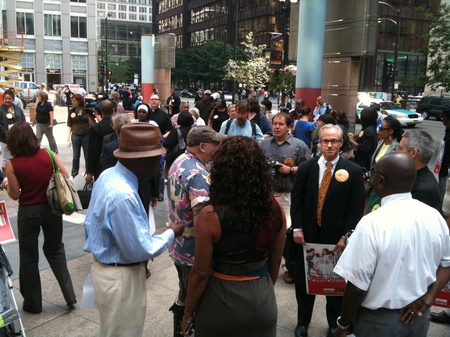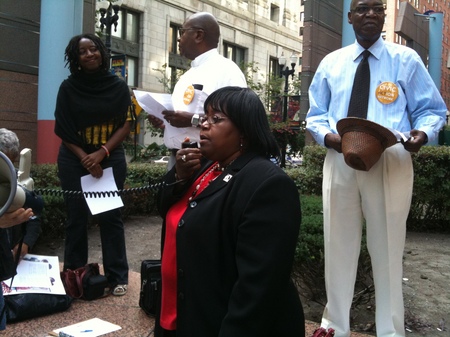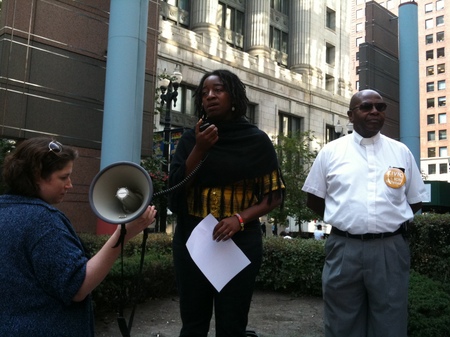| « Beach Clean-Up Saturday at North Avenue Beach | Olympics, the Chicago way » |
Event Mon Sep 21 2009
Fighting For Children With Incarcerated Parents
 "Sometimes, people need help. And when people are asking for help, they normally want it." Darlene Horton says this to Mechanics just outside the James R. Thompson Center Friday afternoon. Dozens of community activists and supporters are crowded around the Center, getting ready to attend a legislative hearing on an issue they all view as urgent: legislative reforms to protect children with incarcerated parents. These children, they argue, are too often left alone, struggling to understand what happened to their parents.
"Sometimes, people need help. And when people are asking for help, they normally want it." Darlene Horton says this to Mechanics just outside the James R. Thompson Center Friday afternoon. Dozens of community activists and supporters are crowded around the Center, getting ready to attend a legislative hearing on an issue they all view as urgent: legislative reforms to protect children with incarcerated parents. These children, they argue, are too often left alone, struggling to understand what happened to their parents.
On Friday afternoon, the rally brought together advocates and community leaders to discuss reform for the nearly 90,000 children who have an incarcerated parent, according to the Community Renewal Society, a social justice group that organized the rally. Afterwards, advocates packed the 16th floor of the Center to attend a legislative hearing on the issue. Mechanics spent a few hours at the rally and hearing to listen to some stories.
Horton, a 48-year-old mother of four, has spent time in prison for drug-related charges in the past. One incident sticks out clearly in her mind. Twelve years ago, she was arrested in a Peoria Kmart for shoplifting. Horton says her children were left unattended at the store as police took her away. She still thinks about that day, and knows that her incarceration -- from this incident and others -- has affected her children. She accepts responsibility for her choices, but wishes something could have been done to help her children when she couldn't.
"They're still going through things now, even though my 7-year-old is now 21 and my 12-year-old is now 27. It's still going on," says Horton, who now works for the Chicago Legal Advocacy for Incarcerated Mothers. "There were clearly some issues of drug addiction...[but] for them not to address the issues, and instead locking me down for 23 hours a day, it [created] some more issues."
Horton says after her stints in prison, she tried calling hotlines to get better, but she felt blocked -- she couldn't afford treatment, and neither she nor her kids understood the disease of addiction. "A lot of my problems stem from my childhood...It just kind of trembled down and then addiction came as a way of medicating to not feel," she says. "I'm not making excuses for my part that I played in it, but sometimes people need help."
Click here to read an excellent Tribune article on Horton's experience, and here for a Mechanics exclusive video of Horton speaking outside the Thompson Center today.
Rev. Calvin Morris, executive director for the Community Renewal Society, came out today because it's important to give voice to children, "many of whom are voiceless." He says when parents are arrested, their children are sometimes left alone.
"That has happened far more than we think," he says. In addition, many times, after a parent in incarcerated, the primary caregiver becomes a grandparent or great-grandparent. But many of them are living off of Social Security, not earning enough to support their grandchildren without any additional help. So how can the children be properly taken care of?
"We also want the legislature and the Illinois Department of Corrections to be aware of how difficult it is for the families to get to see their parents," Morris says. "There are protocols that the families are not aware of, and what we're urging is that they prepare a little booklet that would help the parents, the caregivers, understand what their regulations are. Because sometimes, the families will travel three, four, five hours to get to a facility and find out they can't go in. Or find out that if they have four children, they can only let two children in, or things of this nature."
Click here for an exclusive video of Morris speaking today, and here for a video of him leading the group in a rendition of "This Little Light of Mine."
Taking parents away from their children for non-violent offenses only hurts communities, argues Rep. Annazette Collins (D- 10th District), speaking to Mechanics outside of the Thompson Center.
"It does no good for the child," she says. "The kid either goes into a foster home or is left homeless because a lot of times they're trying to raise themselves. And a lot of times the parents are incarcerated for drug, non-violent offenses. So we need to find a way to work it out. We need to...figure out how to have them serve their time in the community. We're not saying what they did is right or wrong, it just creates more poverty if you continue to move parents."
At the legislative hearing on the sixteenth floor of the Thompson Center, a woman reads an emotional written testimony from another woman who barely saw her mother after she was incarcerated.
"We received no help from any other family member," she writes. "Sometimes, my brother, who was 15 at the time, would resort to stealing food and necessities we needed to survive. We never had any real visits with our mother while she was incarcerated. She was sentenced to four years in prison. We would try to find her and write her a letter, hopping that nobody would find out about us being on our own and come and take us away before we saw mama again."
After hearing this testimony, Rep. William D. Burns (D- 26th District) tells the crowd that he agrees that prison sentences for first-time, non-violent offenders isn't the best option. He hopes Senate Bill 1289, which he co-sponsored, helps reduce the number of families torn apart. "So the objective is to create an assessment tool which will look at the strengths and deficits of the person who has been arrested, and if that person would be better treated with community-based alternatives," he says.
In an emotional response, Rep. Mary E. Flowers (D- 31st District), says she knows what happens to children who are left behind -- they're often sexually abused, "and they too end up as a part of the system," she says. In 1983, she tells the crowd, 456 women were incarcerated. By 2002, that number had risen to 3,400.
"This is a means in which havoc was created to destroy so many people's lives for crimes that should have been probational," Flowers says. "It's just like a cancer. You don't go for treatment one time and your cancer is cured. You have to constantly go until the problem is eradicated."
Unfortunately, this problem affects minorities and the poor the most, in communities where they often have no control over the amount of drugs and alcohol that come in, she says. Women in particular, she adds, are the most afflicted, often suffering silently because they can't see a doctor and are traumatized from violence.
"I'm here today to say to you that enough is enough," she says. "I will leave no stone unturned to eradicate this illness in your community and to make sure your sickness with drugs and any other illicit problems that we may have will be addressed in a proper way...in order for you to clear your name and get your child back from DCFS, there are certain things you have to do, but there's no ways and means for you to do it. It's not your fault. It's not your fault. And I refuse to allow you to carry that burden. We created this mess. And it's going to take us, we the people and the lawmakers of the state of Illinois, to eradicate this mess."














LaShawn Williams / September 20, 2009 8:07 PM
Great coverage of this event--it is a story that definitely needs to be told...